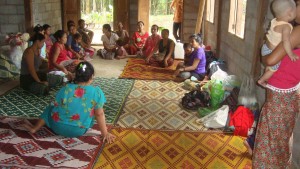Cholera outbreak in Three Pagodas Pass village
July 1, 2015
In recent weeks forty people have been treated for cholera in Ga Own Guu village, located in the Thai-Burma border area of Three Pagodas pass. The village, comprised of approximately eighty households in total, is located in territory under the control of the Mon armed group, the New Mon State Party (NMSP).
 Reportedly, the cholera outbreak began when three patients from Htar Wal Su and Baho Chaung villages, also in the Three Pagodas Pass area, were brought to Ga Own Guu village’s NMSP clinic. Since neither of these villages have their own clinic, the patients, infected with Cholera, walked forty minutes to reach the clinic in Ga Own Guu. It is suspected that, after the patients arrived at the clinic, poor sanitation in Ga Own Guu meant that Cholera, which is transmitted through contaminated food and water, began to spread throughout the village.
Reportedly, the cholera outbreak began when three patients from Htar Wal Su and Baho Chaung villages, also in the Three Pagodas Pass area, were brought to Ga Own Guu village’s NMSP clinic. Since neither of these villages have their own clinic, the patients, infected with Cholera, walked forty minutes to reach the clinic in Ga Own Guu. It is suspected that, after the patients arrived at the clinic, poor sanitation in Ga Own Guu meant that Cholera, which is transmitted through contaminated food and water, began to spread throughout the village.
On June 19, Border Health Initiative (BHI), a Mon community-based organisation whose mobile clinic visits Ga Own Guu, sent a group to the village to administer Doxycline treatment to those infected, while also raising awareness about Cholera. A BHI staff member commented, “We heard about [the Cholera cases] after they had suffered for five days. Fortunately, no one has died. […] Now, the number of patients has decreased”.
The BHI staff member discussed worries that poor sanitation and health education make villagers more susceptible to such outbreaks. She detailed, “The villagers lack knowledge on health issues. They don’t know how to prevent disease. Also, the village is not very clean. The village doesn’t have enough toilets. Sometimes, four houses share one toilet”.
The cholera outbreak has compounded worries about rising ill health in the Three Pagodas Pass area in recent months. According to residents, in the last month many people in the town of Three Pagodas Pass have contracted chronic diarrhea, with four patients dying from the infection; the local Health Department has not yet determined the root cause of infection in this case.
Comments
Got something to say?
You must be logged in to post a comment.




















































